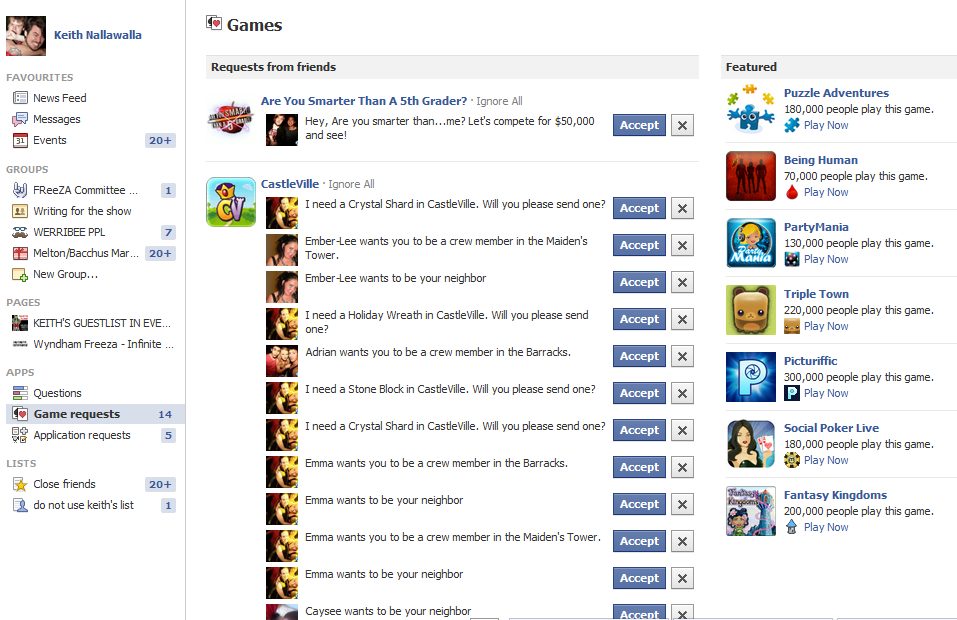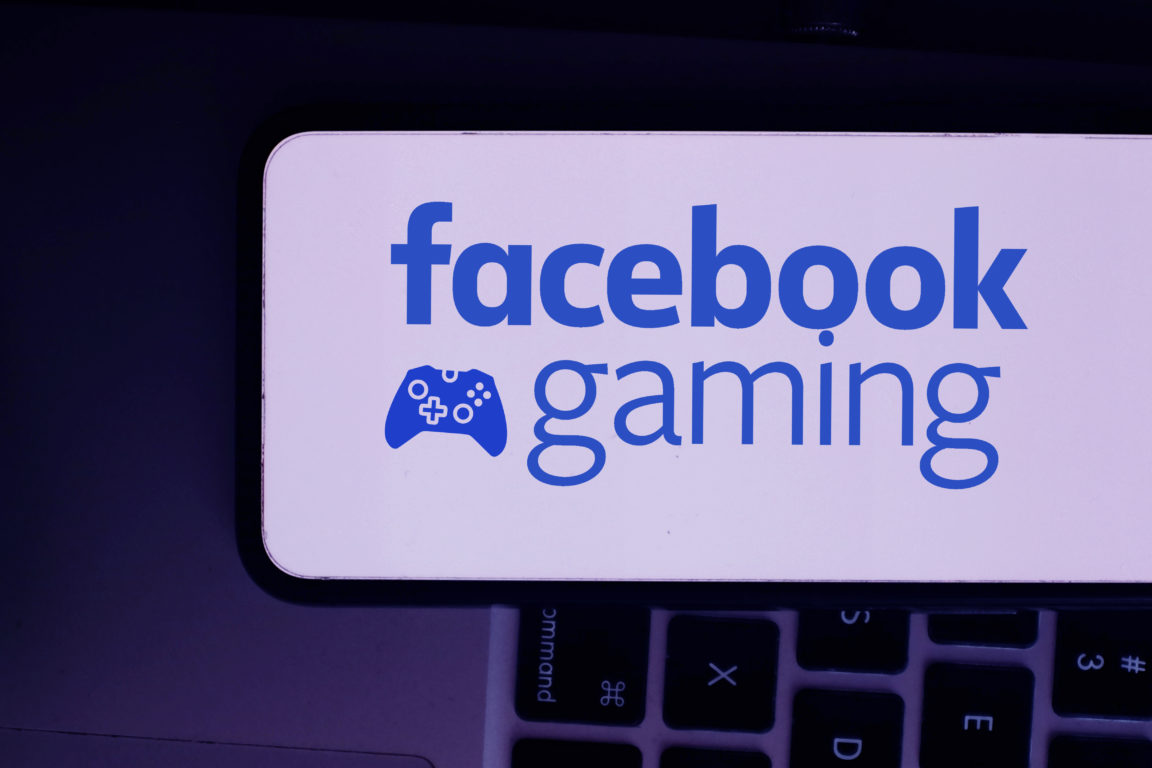This article was originally published on Social Media Overflow in 2012.
Other than being a great social networking website, Facebook is also a very popular gaming website. Millions of people participate in games on Facebook regularly and like many other gaming or internet activities, it is something that may cause some issues if the parents do not understand how Facebook games work and if the children do not manage their time properly. This article should help parents understand why their kids cannot simply “pause their game and come to dinner” or why they “need” to play at a certain time.
Facebook games are quite popular, but not all people on Facebook like them or want to participate in them. There are various reasons why people may not want to participate in Facebook games:
- They would rather play a retail game on PC or console
- They do not like video games
- They do not have time
- They find Facebook games intrusive
- They find the games annoying because they keep prompting you to pay real money
- They might find these types of games boring
- They might not feel comfortable asking friends to play it with them or do not have enough friends who play it yet.
Reasons why people may play Facebook games:
- Low specifications allow them to run on almost any computer connected to the internet.
- You don’t have to buy a new console to play.
- They are more or less free to play to some degree.
- You can easily play any game without having to go to the shops or installing it.
- You can’t “lose” in social games — there isn’t usually a “Game over” screen, you just keep progressing forward, or remain stationary if you do not continue playing.
- Their friends are playing it; if your friends are playing a game and ask you to join, it may influence you into playing as well. In many social games, you can send and receive items between friends, this is a benefit of getting your friends to play as well.
- They are easy and anyone can play them. Most Facebook games just involve clicking on things, they do not rely on reflexes so they appeal to a lot of people where action games do not.
Virtual goods
Facebook games are free to play but generally have an option to pay real money to progress quicker. Facebook uses Facebook Credits as a universal currency for its games and apps. These Facebook Credits are used to purchase “virtual goods” which could be anything you may pay for within a game, typically special items or shortcuts to speed progression in a game.
How to access Facebook Games.
So where are these Facebook Games anyway? If you look at the left-hand side of your home page, you might see Game requests in the Apps section, here you will see any games people have sent you requests from. If you choose to try out Facebook Games, something a lot of your friends play might be a good indication of what is worth playing, as it will be easier to progress in them since many games reward you for having lots of friends or “neighbours” or whatever the particular game refers to them as.

You can also access them by going to https://www.facebook.com/games or by searching “Games” in the search box at the top of Facebook, it will be the result that has the two playing card icon next to it as seen next to the heading “Games” on the above picture. It will also bring you to the screen shown above, below the requests you will also see Recommended games.
How to buy
To purchase credits you go to the following link:
https://secure.facebook.com/settings?tab=payments
It can also be accessed by clicking on the drop-down in the top right corner of the screen next to the Home button and clicking on Account Settings
This screenshot is lost to time
Then click on Payments on the left.
This screenshot is lost to time
Click on Credit balance – Buy more
This screenshot is lost to time
And then you can buy credits using whichever of these methods you prefer, these are the Australian options, different countries will have slightly different choices, the ones at the top are universal though.
How much do Facebook Credits cost?
This screenshot is lost to time
Here is the price of Facebook Credits when paying via PayPal
This screenshot is lost to time
Here is the price for Facebook Credits when paying via mobile phone, notice that the price is about double that of PayPal, so this option is not very economical, if your children use mobile phones, avoid letting them learn how to add their own credit. You can purchase Facebook Credit for them yourself instead so that you can control their spending. Maybe limit them to something like $10 or $20 a month so that they can get some things they want, but do not waste too much money.
Other ways to earn Facebook Credits
Some Facebook Games will have links to ways to earn free Facebook Credits.
This media is lost to time
The video above went for several minutes and after you watch it, you get a free credit. It is hard for you to tell how long a video is going to be, but they will usually be more than 30 seconds. These sort of offers are not always available. Other options are kind of spammy.
This screenshot is lost to time
To get this, you need to register, place an order and pay for postage etc. It may even require you to buy additional things from them. It is probably an OK deal, but it requires you spend money on stuff you may not need or want, it will get you about $10 worth of free credits though. Hopefully the deal equals $10 or less but they don’t make it very clear on that. It is probably easier and cheaper to just buy credits via Paypal or even cheaper still, don’t buy premium items in your games. Also if you try one of these deals you will probably end up on their mailing list.
Other types of currencies in games
Different games will use different types of currency in their games. Often they will be coins or gemstones or something similar. They are currency earned and spent on the normal free items in the games. Sometimes there will be premium currencies that can be earned (very slowly) or bought using Facebook Credits. Some games that exist outside of Facebook as well as within Facebook may use their own currency as well.
This screenshot is lost to time
Most popular games
According to TheWondrous.com these are the top 10 Facebook games (data collected in February 2012)
1. Indiana Jones Adventure World
6. Cityville
9. Bingo Blitz
10. Mafia Wars 2
Microtransactions
In many Zynga games, you require “Energy” to play. Doing particular “Missions” consumes a certain amount of energy. Once you use up some energy it will slowly recover over several minutes or hours. If you run out of energy you cannot progress and have to wait until later when your energy has returned. The energy will slowly return whilst playing the game or if even if you go away and come back later. This can be quite annoying, if you do not wish to wait several hours, you can pay real money to skip these waiting periods.
What can you expect in a Facebook Game?
Whenever you first start a Facebook Game it will request permission to access data from certain parts of your profile — this is standard and not a huge deal. It just means they can use your display picture next to your name and post to your Timeline etc (This is usually done with your permission after you achieve something in the game).
This screenshot is lost to time
Most games involve you just using your mouse to click on things, clicking with the mouse often controls movement and actions occur with onscreen buttons that appear when you hover over certain things. Examples of this are The Sims Social, Farmville, Barn Buddy etc. These types of games are addictive because they give you time-based scenarios, such as planting vegetables which take a certain amount of time to grow.
This screenshot is lost to time
This is a screenshot from The Sims Social. Note the photos of real people next to their names at the bottom of the screen; this relates to the initial Request for Permission that was asked when you first start a game. Now notice that Strawberries cost 6 silver coins and takes 5 minutes to grow and will give you 44 coins if you harvest them in time.
Similarly in the game Barn Buddy, the plants here cost a value and must be harvested soon after that time period or else they will decay and be worthless and then your money will have been wasted. Luckily this is all to pretend money, but it is still frustrating if you forget to come back after planting lots of seeds and losing all the money you have spent. In this game, tomatoes cost you 720 coins and will give you 960 back after 6 hours.
Understanding the addictive nature of these games
Many people who play these games regularly will plan their crops around their daily routine. Perhaps it is bedtime and you know you will be waking up in 6 hours time, you may plant these tomatoes now so that they will be ready when you wake up and log back in.
These games encourage careful planning and time management skills, which can be a good thing. However, if your child has crops to harvest right after school ends and you take them on an unexpected trip to the supermarket first, followed by a trip to the grandparent’s house, you might have a rather annoyed child or teenager on your hands. It sounds silly, but it could really bother someone if they are in a hurry to go home and check their crops. If they have spent most of their money planting plants and then have them all die, it might be hard for them to recover from it. Luckily in most of these sort of games, the more expensive items will have a longer period of time before the crops wilt and die.
This screenshot is lost to time
Expensive crop has very long grow, harvest and wilt period.
This screenshot is lost to time
Cheap crop has quick grow, harvest and wilt time.
Above is a Fig from Barn Buddy, it is an expensive item, It takes 2 days, 6 hours to grow and then it is harvestable for 2 days and 6 hours and then is wilting for 2 days and 6 hours. The period to harvest this is several days, so something like this will be easy to get. but if it is something cheaper, say something that takes 2 hours to grow, those will only be harvestable for 2 hours before they start to wilt. When they start to wilt they are still harvestable but you will not receive as much money for them.
Other games might not be as generous with harvesting times. If you get your kids to show you how their games work, you will understand why they insist that they “need” to go on Facebook at certain times to harvest their crops (or do whatever other activity) but you should also make sure that they learn to manage their time properly and not have crops due at times they shouldn’t. Do not let them use their crops as an excuse to use Facebook whenever they want, use it as a way for them to learn about managing their time. If your child does not play these games, then that’s probably even better because that’s less for you to worry about.
Cheaper than retail games
Because these games are technically free, they have a big appeal to those who cannot afford to buy full-priced console games. In Australia, a new release PS3 or Xbox 360 game can sometimes cost over $100. It is getting easier to find a good deal on these games, but they will usually be at least $70-80 or more when they first come out. Not all console games are even that good. It is not uncommon for someone to spend an exorbitant amount of money on a new game only to realise it wasn’t really that fun after all. They then leave it on a shelf for years as it rapidly decreases in resale value or trades it in for something else for a lower price. Whereas with social games, you can try any game for free and only have to pay extra money if you really want to. If you don’t like the game there is no real obligation to keep playing it — just block it from your account and you never have to worry about it again.
Overall, if you had to find a positive to your kids playing these type of games, it is that they are cheaper than retail games and may help improve their time management skills and help organise themselves into a routine. It could also keep them glued to a computer screen more than ever. For the sake of everyone involved, try and understand their gaming habits and be open-minded and reasonable. If you have had a problem with your kids playing these games or your parents have a problem with your gaming habits feel free to comment below.





